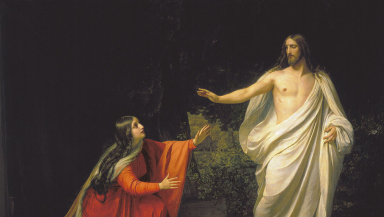
Mary Magdalene has been a source of discussion down through the centuries. Was she a prostitute? Was she Jesus's wife?
One question about her identity that often gets overlooked is the significance of her name. What does 'Magdalene' mean, and why is it so important that the gospel authors saw fit to record it?
According to Professor Joan Taylor of King's College London, there is a great deal to be unpacked here.
A quick search on the internet or around Wikipedia will reveal the story that is traditionally believed and held to be true by most people, that the word Magdalene refers to a large port town called Magdala on the Sea of Galilee, and that Mary was known as being from there.
Archaeologists have uncovered evidence to support the existence of such a town, with one of the largest harbours to be found on the Sea of Galilee.
But Professor Taylor argues there is a problem with the interpretation of this place as the 'Magdala' that Mary supposedly hailed from.
"None of the historians, people like Josephus or any of the other Greek or Latin texts of that period, reference a town called Magdala," she said at a lecture at King's College last night.
This is a rather large stumbling block for the traditional theory. If this town was called 'Magdala', why wasn't it mentioned in the writings of the time?
There is another problem too. The word 'Magdela' is the Aramaic word for 'Tower'.
Professor Taylor says this challenges the traditional theory as the name is "not distinctive" and "seems rather odd".
Imagine a city named 'building', a town called 'apartments', or a village called 'bridge'. If someone were to introduce themselves as "John Smith from the Building" the next logical question would be "which building?"
But the idea of a name like 'tower' that does give us some hints as to the kind of place Mary Magdalene might have been from.
In the UK, for example, there actually is a village called 'Bridge', in east Kent, just over three and a half miles from Canterbury. It is a small village of 1,500 people, and the name would mean nothing to anyone living west of the Isle of Sheppy or east of Dover. Just as the name of a town called 'Bridge' would only mean something locally, it stands to reason that the name 'Magdela' with the meaning 'tower' might be only a local reference to a small settlement, with little meaning to people outside.
This idea of Mary Magdalene being a small town woman changes the debate about her supposed life of vice. The suggestion of her prostitution derived from, among other things, the fact that her name is unlike many women's names of the time.
Most women had names that linked them to a father, brother, husband, or son. But Mary Magdalene's name doesn't link her to any male figure.
The unusualness of a woman with an independent name, coupled with her supposed origins from a sprawling metropolis port town, were two of the major factors that fostered the belief that she was a prostitute. But if she in fact hails from a small village, it does allow for the possibility that she was not a prostitute.
Professor Taylor also considered the way in which the Gospels talk about Mary when they use the word Magdalene. None of the texts use the Greek word for 'from' and some of them place a definite article, describing her as "Mary the Magdalene".
"It seems to be a kind of nickname, and we only get these nicknames for people who are close to Jesus," Professor Taylor postulates.
"It shows the kind of closeness of a group of people who might think of themselves as almost like brothers and sisters."
Some of the ancient Greek formations around the word Magdalene suggest that a feminine possessive form was added to the name. If we were to translate it into English, she might have been called 'Mary the Toweress' or 'Mary the Towerette'.
Other figures close to Jesus had nicknames. The disciple Simon was known as Peter, or 'the Rock' in English. Another Simon was nicknamed as being 'Zealous', rather than belonging to a group or party called the Zealots, and the sons of Zebedee were referred to affectionately as the 'noisy men'.
This kind of intimacy is part of the reason why some people have gone further and suggested Mary Magdalene was Jesus's wife.
Professor Taylor believes the name itself is enough to discredit this theory.
"Mary's name shows an independence from men that tells us she clearly wasn't married. That includes being married to Jesus," she said.
Mary Magdalene was certainly a close figure to Jesus, being at the foot of the cross as he was crucified, and being the one who Jesus first revealed himself to after the resurrection.

The fact she took the news of Jesus' return to life back to the disciples means she should hold the title of "Apostle to the Apostles", Professor Taylor suggests.
In the end, exactly why she would have been called the "Toweress" or "Towerette" is not really clear. Was it a nickname, like Peter or Simon the Zealot? Or was it indeed her town of origin, just as Jesus was known as "Jesus of Nazareth" or sometimes as just "the Nazarene".
If it was a nickname, it could have any number of possible meanings. Professor Taylor speculates: "Was she tall? Was she regal? Was she stately? Was she able to see far into the distance like a tower would enable you to do?"
Professor Taylor accepts that the exact origin of the name is something that is probably lost to history, but that it would seem to be some combination of Mary's place of origin and something distinct about her appearance and character.
Whether it is to do with place of origin, or a more personal connection, being nicknamed in this way suggests she was someone of great importance within Jesus's circle of followers.
As Professor Taylor puts it: "Her name not only indicated her providence, but also her significance. Just as Peter was a rock, she was also a tower."













